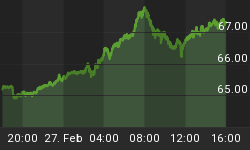Who should investors listen to; the markets or the Fed? One says we are in for a double dip recession, the other just raised GDP forecasts.
The head of our central bank Benjamin S. Bernanke has a perfect track record for predicting economic outcomes. Unfortunately, his track record is only perfect due to its 100% inaccuracy. The Fed Chairman once assured investors that the subprime housing crisis was contained and would not bring down real estate prices or affect the overall economy.
Then, after being proven completely wrong by the near collapse of the entire global economy, Mr. Bernanke moved to an emergency Federal Funds target rate of 0-25 bps and has held it there for 17 months. And even though the economy has posted three straight quarters of growth, has shown no inkling to provide American savers with a decent return on their money deposited in banks.
Now we find the Federal Reserve once again proving it has an unlimited aptitude for ineptness by actually raising their G.D.P. forecast from a growth range of 2.8%-3.5% to 3.2-3.7%. That's correct; Federal Reserve officials raised their U.S. growth estimates for 2010 and lowered forecasts for unemployment and inflation, according to minutes of the Federal Open Market Committee meeting on April 27-28. They left their 2011 forecast unchanged at 3.4 percent to 4.5 percent. Fed officials' forecast for the average unemployment rate in the last quarter of 2010 fell to 9.1 percent to 9.5 percent versus 9.5 percent to 9.7 percent estimate made in January.
However, contrary to the Fed's predicted trend of improvement in employment numbers and economic data, on Thursday we saw first time claims for unemployment jump by 21,000 to 471,000 in the week ended May 15th. The four-week moving average also climbed to 453,500 last week from 450,500. Additionally, the Index of Leading Economic Indicators during the month of April saw a .1 percent decrease. That dip in the Conference Board's outlook for the next three to six months followed a revised 1.3 percent gain in March and was the first decline for the index in a year.
Meanwhile, sovereign debt contagion threatens to dismantle the Euro currency as Eurozone borrowing costs may become intractable if interest rates continue to rise. China is busy trying to pop their property bubble at the same time the Shanghai Composite Index is down 21% in 2010. Not to be outdone, Australia has collapsed their resource sector by imposing a 40% tax on the earnings of mining companies.
The threat of a metastasizing government debt default crisis similar to the credit crisis of 2008 has sent crude oil prices tumbling from over $85 a barrel to $68 in a matter of weeks. Dr. Copper has plummeted from $3.60 a pound in April to $2.93 as of this writing. But none of that matters to the Fed or gives them pause to reflect on their ebullient outlook.
It doesn't take superhuman predictive powers to have the ability to look at markets. What is it that Mr. Bernanke and company look at other than the rear view mirror when making prognostications about growth, unemployment and inflation? We have given the most incredibly powers to the Federal Reserve; namely, to dictate a target rate for the cost of money. But we have allowed to be appointed at the Fed a group of individuals who not only cannot accurately assess a given series of data but also have chosen to completely ignore markets.
The CRB Index is trading at its lowest level since October of 2009 and is telling investors that the global economy is in the process of slowing. But the Fed is stacked with academics that have never had to earn a living by predicting economic and market directions. Their failure to listen to the message of markets is the key reason they have such a miserable record of making accurate projections. For the betterment of the nation, the next appointment to serve at the Fed should be someone from the trading pit and not from Princeton.















